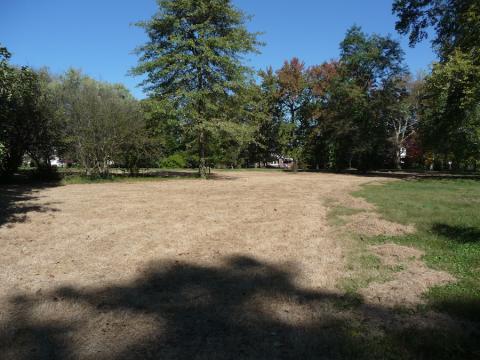ST. LOUIS NO SPRAY COALITION: FREQUENTLY ASKED QUESTIONS
The St. Louis No Spray Coalition has met with members of the St. Louis Board of Alderman (BOA) to
advocate for the Healthy Outdoor Parks and Public Spaces (HOPPS) bill. Parks, playgrounds,
school yards, roadways and other public areas in St. Louis are regularly sprayed with large amounts of
toxic pesticides that are known to cause cancer, developmental and learning disabilities and other
health problems and exacerbates asthma. HOPPS would mandate safe, non-toxic groundskeeping and
ban the use of toxic pesticides. Below are answers to Frequently Asked Questions re: the HOPPS bill:
1) What is a pesticide?
It is an agent that kills or helps to mitigate weeds, insects, rodents or fungus. Commercial pesticides
can contain toxic chemicals, while alternative methods are made of substances that are safe to use.
Pesticides include herbicides, insecticides, rodenticides and fungicides.
2) How do Pesticides affect human health?
Evidence has mounted showing that pesticides adversely affect human health. Records obtained by the
St. Louis No Spray Coalition detailing pesticides used in St. Louis parks revealed a toxic brew of
chemicals used for weed and pest control in the City during 2018-2020, including: 850 gallons of
Roundup Pro Concentrate, a compound which which has been determined to cause cancer; 180 lbs of
Treflan, a pre-emergent herbicide whose active ingredient (Trifluralin) is listed as "possible
carcinogen" by the EPA; 335 gallons of Resolute, an herbicide whose active ingredient (prodiamine)
was listed as a "possible carcinogen" by the EPA in 2002. The International Agency for Research on
Cancer, the U.S. Department of Health and Human Services' Agency for Toxic Substances and recent
court decisions have established a clear link between glyphosate (the active ingredient in Monsanto's
Roundup herbicide) and non-Hodgkins lymphoma plus other cancers. There is also evidence that
Monsanto's own studies of the risks of Roundup/glyphosate found risks of cancer almost 4 decades
ago! For more on faulty, corporate glyphosate studies, go to:
https://www.theguardian.com/business/2021/jul/02/glyphosate-herbicide-ro...
studies
The National Academy of Sciences reports that children are more susceptible to harmful
chemicals than adults and that chronic low-dose exposure to certain pesticides might pose a hazard to
the health and development of children. The MO Department of Conservation advises parents to “avoid
using [pesticides] altogether.” The World Health Organization (WHO) cites that over 30% of the global
burden of disease in children can be attributed to environmental factors such as pesticides.
3) Would the HOPPS bill stop all pesticide use?
HOPPS would only apply to City owned land like Parks, schools, playgrounds and other public places.
It would not apply to landscaping and agriculture on privately owned land.
4) Have other cities and municipalities passed similar pesticide bans?
Over 140 cities, municipalities and HOAs have full or partial bans on pesticide use. These range from
bans that limit herbicide use on public lands, total bans on the use pesticides for public and private
property and mandates for the exclusive use of organic methods. See the full list by visiting this
website:
https://www.nontoxiccommunities.com/cities.html
5) How do Pesticides affect the environment?
Chemical pesticides are toxic to bees, butterflies and other pollinators. They also destroy the habitat
pollinators and other plant and animal life need to live.
Pesticide residues runoff into our rivers and waterways, endangering our waterways and endangering
aquatic life. Certain herbicides have been found by the USEPA to be highly persistent and toxic to
aquatic organisms.
Herbicides drift can go miles and destroy non-target species of plants.
Herbicides also act like antibiotics in that they kill the beneficial flora in soil, like antibiotics kill the
good bacteria, leaving the soil depleted and less able to sustain intended plantings. This depleted soil
then is more at risk for weeds to get a stronger hold since the intended plantings, including trees, are
not as healthy.
6) Are there effective, alternative methods to deal with weeds and insects?
Alternative methods of weed management rely on the same approach used in organic
gardening/farming, with soil health being the foundation.
It starts with testing the soil for a baseline of soil health. To rebuild soil health, organic fertilizers
and aeration are used frequently. This is especially important in fields that are heavily impacted.
Over-seeding is recommended to help crowd out weeds. Although organic fertilizer is more
expensive than than synthetic fertilizer, once the soil is mediated, issues with weeds and the need
for fertilizer are greatly reduced.
Other organic methods of weed control include mulching, limited tilling, using non-toxic
pest control agents such as: vinegar, essential oils, nematodes, rubbing alcohol (for killing weeds
in driveway cracks and similar circumstances) and choosing pest-resistant plants that provide
habitat for wildlife.
7) What resources are available to help St. Louis Parks transition to non-toxic groundskeeping?
Beyond Pesticides offers free training through their Parks for a Sustainable Future pilot program to
cities that want to organic landscape management. St. Louis could take advantage of this program!
To learn more, go to the Beyond Pesticides website:
https://www.beyondpesticides.org/resources/power-organic-parks-program/o...
8) Does using alternatives to toxic pesticides cost more?
Though costs may rise somewhat initially, the cost of organic land management reduces costs in just a
few years. In 2019, the City of South Miami completed a two year pilot program that required city staff
and contractors to follow practices intended to eliminate toxic pesticide use and limited inputs to only
organic certified products.
The city codified the practices into law after the success of this program regarding cost. A city
memorandum reads, “This initiative has been a qualified success, allowing the city to cut down on its
waste footprint significantly at relatively little expense”
The HOPPS bill has been endorsed by the Sierra Club of Eastern MO, Missouri Coalition for the
Environment, Gateway Green Alliance, Beyond Pesticides and Green Party of St. Louis
For more information for how you can help us protect people from pesticides, contact:
St. Louis No Spray Coalition
email: nospraystl@gmail.com
website: www.gateway-greens.org

